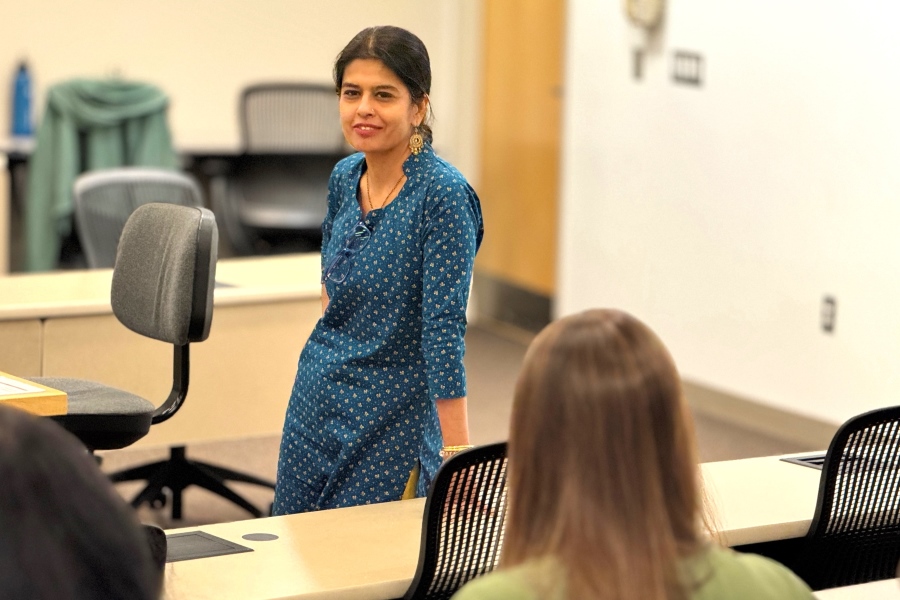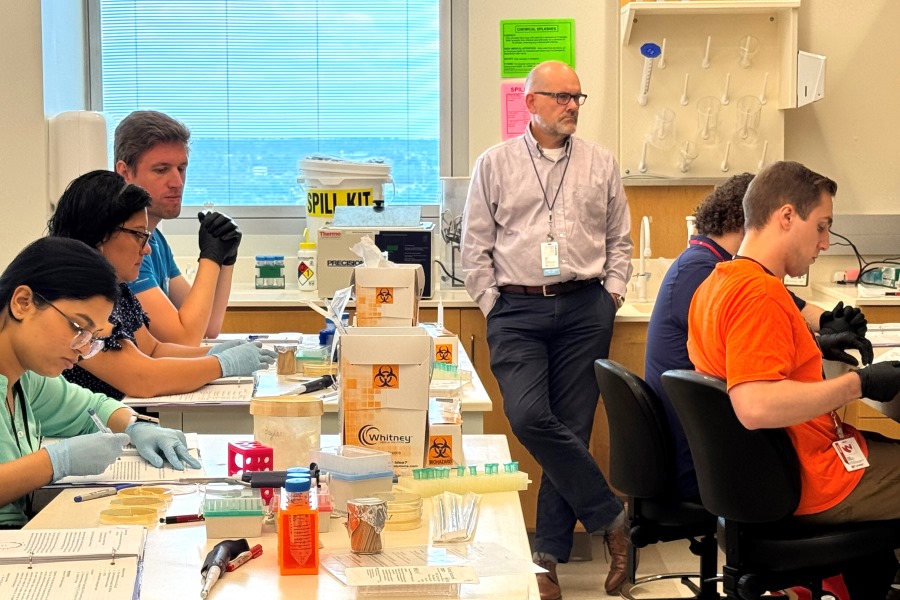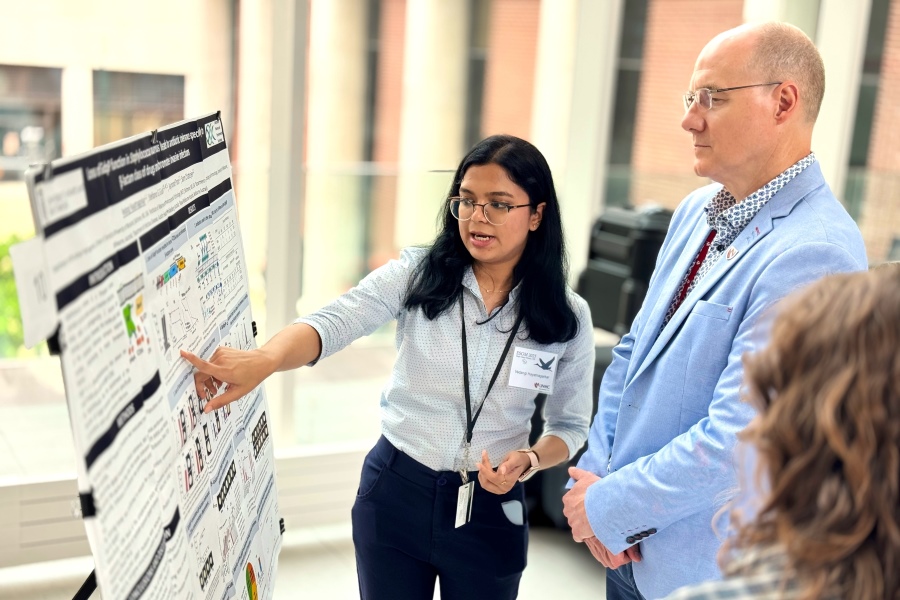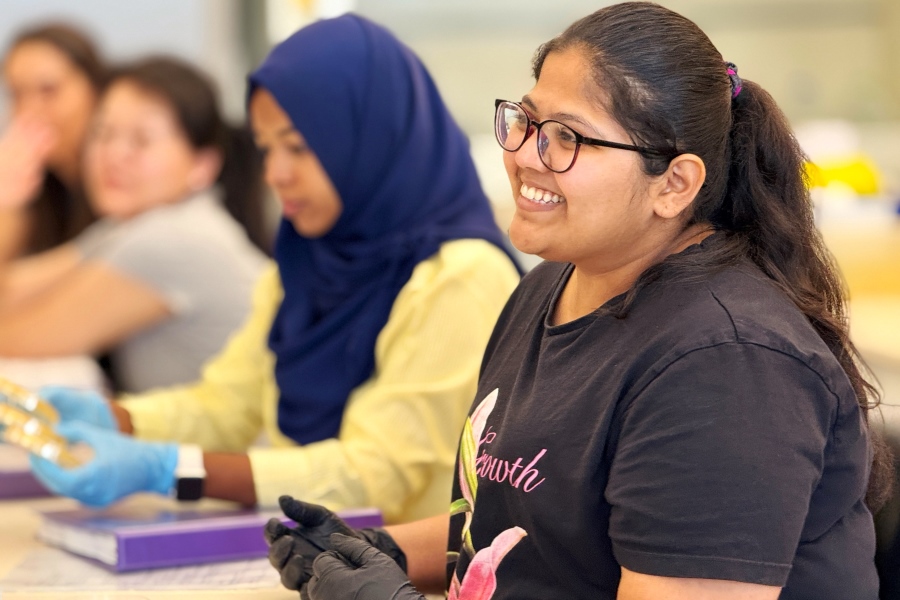Sixteen young researchers received intensive instruction in genetic and metabolic techniques last month at the University of Nebraska Medical Center.
The annual workshop by the Center for Staphylococcal Research (CSR) is supported with funds from UNMC’s Department of Pathology, Microbiology and Immunology. The workshop, “Essentials of Staphylococcal Genetics and Metabolism,” presents participants with an advanced understanding of the techniques commonly used by the staphylococcal research community.
Paul Fey, PhD, professor, vice chair of research in the department and associate director of CSR, said this year’s workshop drew participants from around the nation and from three other countries—Denmark, Canada, and Spain.
The workshop—intended for pre-doctoral and postdoctoral trainees, new investigators, and other lab staff interested in enhancing their knowledge base and technical skills—offers a mix of classroom lectures and laboratory instruction, presented by the department’s faculty and staff. Students also had a little bit of downtime to explore the city—one afternoon included a visit to Henry Doorly Zoo and Aquarium. The event concluded with a poster presentation by workshop participants sharing what they’re working on back home.

Dr. Ken Bayles, vice chancellor for research at UNMC and the Center’s founding director, said the workshop helps achieve one of their goals, which is to serve as an educational center for developing scientists interested in pursuing a career in staphylococcal disease research.
“We made a genetic resource, called the Nebraska Transposon Mutant Library, and we started disseminating that, and then we got all kinds of questions about how do we actually use it, how do we move the mutations around, how do we do the genetics? And we realized we needed to do a little bit more to educate people. So we came up with this concept of a summer workshop,” he said.
“As the Center of Staphylococcal Research, we created an event where we would bring people together and just teach them the basics,” he said. “It turned into a summer camp kind of thing where students immerse themselves in this for a week and they get to know each other. Some of them build lifelong relationships. They call it Staph Camp, it’s kind of like their mecca, the Center for Staphylococcal Research. They come from all over the world, they come from Japan and Korea and Europe and India to learn how to work with staph. I think we’re providing a valuable resource for the research community across the globe, for folks who work on staph.”
That assessment was seconded wholeheartedly by Lance J. Pollitz, a pre-doctoral trainee at the University of Illinois Urbana-Champaign. He said the workshop was first recommended by an Illinois professor and later by a current lab partner. “He was like ‘Oh, I went to this workshop and learned a lot, it was super helpful for learning genetic techniques for my project,’” Pollitz said. “And so I had a meeting with my adviser and told her all about it. She was really excited for me to go learn some new techniques.”

Pollitz said he’s glad he came. “It was awesome, I definitely learned a lot,” he said. “It changed the way I think about my project and also just cell biology in general. That’s my biggest takeaway, sort of broadening my perspective on how different areas of cell biology might be impacting each other.”
He said he particularly gained a lot from the metabolism section. “I thought the lab work, the hands-on work, was really informative. I’m definitely taking back that information with me. It was cool to see how each different growth condition affected the cells, how each condition the cell was grown in affected how many cells there were at the end of the day and what the acidity level of the media looked like.”
Luka Svet, a postdoctoral trainee at St. Jude Children’s Research Hospital in Memphis, Tennessee, earned his PhD in bioengineering and biomedical engineering from the University of Leuven in Belgium. “I am mostly a computational biologist with some experience in wet lab work, but slightly less on staph. My boss decided maybe it’s time to gain some extra experience with molecular biology, and since my project is not yet ready to present at the bigger conferences, I could use this time to go to workshops like this and get some extra new skills and knowledge that might become useful.”
Dr. Svet said he liked the workshop a lot. “Quite interesting,” he said, “actually very useful protocols, methods, techniques were presented during the lectures and also during the practicals. Also the social aspect, the networking, talking to others.”

The poster presentation on the last day of the workshop was one highlight for him. “I really liked checking what the others were doing, learning, and in general talking to everyone, and also to the organizers, learning the background of how they, for example, created this Transposon library. Each day had something interesting to listen to, to learn.”
Vedangi V. Hayatnagarkar, a pre-doctoral trainee at the University of Maryland, said the workshop was recommended by a fellow lab member who had attended CSR’s Gram-positive conference. “I’m very interested in staph aureus genetics. I actually created a few mutations in my lab. But I wanted to learn a complete course on staph aureus and get a deeper knowledge of the genetics of staph aureus. So that’s why I applied and came here.”
Hayatnagarker said the workshop was a great experience. “I learned a lot. I learned many new techniques every day,” she said. “I enhanced my knowledge and understanding, and I could get an overview of how broad the staph field is. I didn’t know the different aspects of the field, the different aspects of the genetics of staph. It showed the many possibilities I could touch on during my PhD research.
“I enjoyed the lectures, and I made many friends here,” she said. “We met people from Euro, people from different states, so I made very good connections. And I got to know other fields, the professors here, what they are working on. So it was a good networking opportunity for me.”
